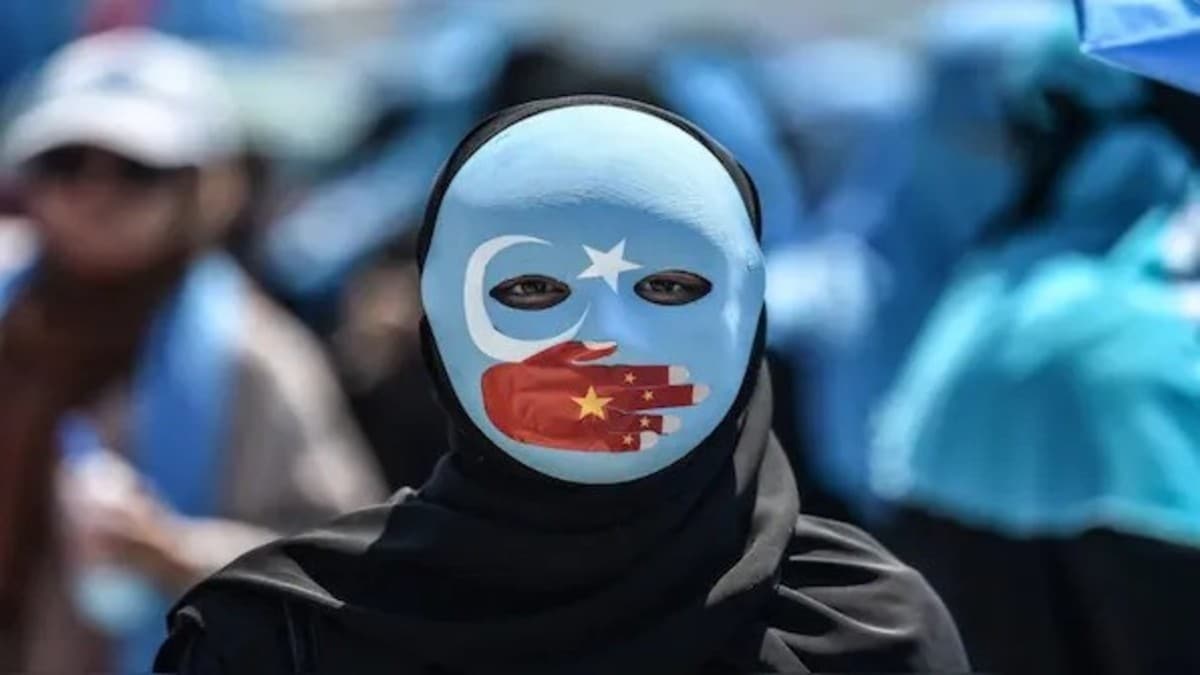Politics
China’s Ideological Institutions Embrace Controversial Policies

Recent publications by Chinese ideological institutions have sparked international outrage by glorifying historical acts of violence against the Uyghur population. On February 4, 2025, the Chinese Red Culture Research Association (CRCRA) released an article extolling the actions of General Wang Zhen, a key figure in the Chinese Communist Party’s (CCP) military campaign in East Turkistan, known as Xinjiang. The article frames the mass killings and suppression of the Uyghurs as effective statecraft rather than regrettable histories.
The CRCRA, which operates under the auspices of the Chinese Academy of Social Sciences (CASS) and the Ministry of Civil Affairs, published an article titled “Wang Zhen Governs Xinjiang: What ‘East Turkistan’ or ‘West Turkistan’? Just ‘Tutu’ Them All!” The title references a slang term meaning “machine-gun them,” illustrating the brutal approach promoted within the text. The article advises against any hesitation, asserting, “just shoot them all!” as a policy recommendation.
The narrative presented by the CRCRA is troubling and explicit. It recounts how Wang Zhen, infamously known as Wang Huzi or “Bandit Wang,” executed collective punishment, stating that five to ten Uyghurs would be killed for every Chinese soldier lost. The article describes his military tactics, including the destruction of entire villages, as necessary for governance. Wang’s policies also enforced humiliation on religious practices, compelling Uyghurs to raise pigs and consume pork, acts aimed at eroding cultural identity.
Revisiting Historical Atrocities
The CRCRA article does not shy away from detailing the violent suppression of protests against these policies. It boasts, “Blood flowed like a river,” and illustrates how Wang manipulated Uyghur leaders, promising them a meeting in Beijing before executing them in a remote location. This chilling account is accompanied by the assertion that even gatherings of three or more adult Uyghur men warranted immediate execution, framing such brutality as exemplary rather than excessive.
This perspective raises alarming implications for the present and future governance of East Turkistan. The article concludes with an assertion that measures of terror have historically pacified the region, suggesting that similar tactics should be employed today. It boldly states, “Without thunderbolts, there can be no compassion,” positioning violence as an essential tool for national interest.
The CRCRA is an official ideological institution within China, tasked with promoting the CCP’s narrative and values. Its recent publication is not an isolated incident, as the organization has received endorsements from high-ranking officials, including Teng Wensheng, former Director of the CCP Central Policy Research Office, and Li Dianren, former Deputy Political Commissar of the National Defence University. Their support signals alignment with the CCP’s broader ideological aims.
International Implications and Responses
Since 2014, China has faced increasing scrutiny for its treatment of Uyghurs and other Turkic peoples, with millions reportedly detained in what many describe as concentration camps. The Chinese government has framed these actions as measures for “poverty alleviation,” “counterterrorism,” and “vocational training.” However, leaked documents and the CRCRA article reveal a more sinister reality of systemic oppression and cultural erasure.
In 2020, the East Turkistan Government in Exile filed a formal complaint with the International Criminal Court (ICC), seeking accountability for genocide and crimes against humanity. The United States, along with several other nations, has recognized China’s actions as genocide. In 2022, the United Nations Human Rights Office confirmed that these actions might constitute crimes against humanity, yet tangible consequences have been lacking.
The CRCRA article marks a critical shift in how these historical atrocities are perceived and discussed within China. No longer hidden, the glorification of past genocide serves as a contemporary blueprint for governance in East Turkistan, sending a clear message to both domestic and international audiences. The Chinese state continues to deny these crimes while simultaneously endorsing the ideologies that justify them.
As the international community grapples with this alarming reality, there are urgent calls for action. The United Nations, democratic governments, and human rights organizations are urged to push for a formal investigation by the ICC into these ongoing atrocities. If the ICC does not take decisive action, the onus may fall on democratic states to establish a special international tribunal.
In 2025, the world faces a critical juncture. Ideological incitement against the Uyghurs is being published and promoted by state institutions, highlighting the need for a collective response. Silence in the face of such blatant oppression is not only complicity but an endorsement of state-led violence. The global community must confront the challenge posed by these ideologies or risk enabling their continuation through inaction.
-

 World7 months ago
World7 months agoSBI Announces QIP Floor Price at ₹811.05 Per Share
-

 Lifestyle7 months ago
Lifestyle7 months agoCept Unveils ₹3.1 Crore Urban Mobility Plan for Sustainable Growth
-

 Science6 months ago
Science6 months agoNew Blood Group Discovered in South Indian Woman at Rotary Centre
-

 World7 months ago
World7 months agoTorrential Rains Cause Flash Flooding in New York and New Jersey
-

 Top Stories7 months ago
Top Stories7 months agoKonkani Cultural Organisation to Host Pearl Jubilee in Abu Dhabi
-

 Science7 months ago
Science7 months agoNothing Headphone 1 Review: A Bold Contender in Audio Design
-

 Sports6 months ago
Sports6 months agoBroad Advocates for Bowling Change Ahead of Final Test Against India
-

 Top Stories7 months ago
Top Stories7 months agoAir India Crash Investigation Highlights Boeing Fuel Switch Concerns
-

 Business7 months ago
Business7 months agoIndian Stock Market Rebounds: Sensex and Nifty Rise After Four-Day Decline
-

 Sports6 months ago
Sports6 months agoCristian Totti Retires at 19: Pressure of Fame Takes Toll
-

 Politics7 months ago
Politics7 months agoAbandoned Doberman Finds New Home After Journey to Prague
-

 Top Stories7 months ago
Top Stories7 months agoPatna Bank Manager Abhishek Varun Found Dead in Well









